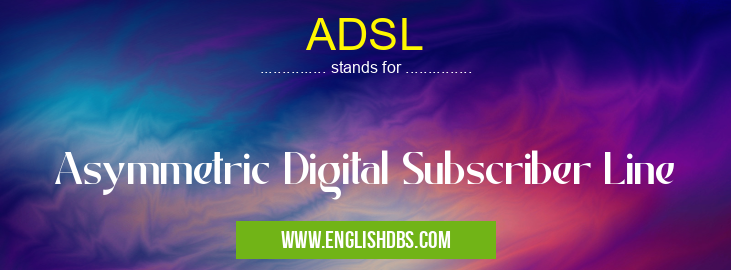What does ADSL mean in NETWORKING
Asymmetric Digital Subscriber Line or ADSL is a type of digital connection used for internet access. It is commonly used by residential customers, who may use it to connect their computers, televisions and other devices to the internet in order to access streaming content, watch movies and shows, and even make video calls. ADSL operates over telephone lines, but unlike dial-up connections, it does not interfere with voice service.

ADSL meaning in Networking in Computing
ADSL mostly used in an acronym Networking in Category Computing that means Asymmetric Digital Subscriber Line
Shorthand: ADSL,
Full Form: Asymmetric Digital Subscriber Line
For more information of "Asymmetric Digital Subscriber Line", see the section below.
» Computing » Networking
Essential Questions and Answers on Asymmetric Digital Subscriber Line in "COMPUTING»NETWORKING"
How Does ADSL Work?
ADSL uses asymmetric technology, which means that different amounts of data can be sent that are dependent on the direction data travels. Typically, an ADSL connection will allow more data to be sent downstream than upstream. Data is carried through the wires of existing phone lines using frequencies that do not interfere with voice service. The equipment used to provide an ISP with ADSL services includes a termination point (NTU), modem and filter.
What Are The Benefits Of An ADSL Connection?
An ADSL connection can offer speeds up to 8 Mbps or faster depending on its availability from your Internet Service Provider (ISP). It also offers a reliable speed since you don't have to worry about bandwidth sharing like satellite or cable internet service providers have to do. Furthermore, you can keep your existing phone line since this type of connection does not take away any phone services that you already have.
Can I Have More Than One Device Connected To My ADLS Connection?
Yes! An advantage of using an asymmetric DSL connection is that it allows multiple users or devices within the home network to access broadband Internet at a relatively low cost when compared to more expensive connections such as T1 circuits or dedicated leased lines.
Are There Any Drawbacks In Choosing An ADLS Connection?
One major drawback of using an ADLS connection is that due to its limited upload speed range, it's usually not suitable for high-quality streaming applications and heavy data usage activities like file transfer and large downloads since these tend require higher upload speed than download speed. Additionally, some ISPs may impose monthly caps on the amount of data one can use in a month with this type of subscription plan so if you exceed those limits you might face extra charges for surpassing those limits
Is There Any Setup Required When Using This Type Of Connection?
Yes, there are some steps required prior to setting up your connection when using asymmetric digital subscriber line (ADSL): you must sign up with your desired Internet Service Provider (ISP) first; then they would provide you all the necessary hardware such as modems, filters etc.; after installation of hardware comes configuring your modem settings; once all configuration is finished your device will get connected successfully.
Final Words:
Asymmetric Digital Subscriber Line (ADSL) is an effective way for consumers to have fast and reliable internet access in their homes without interfering with their existing voice services. Its benefits include faster speeds than dial-up connections as well as being able to connect multiple devices simultaneously. Although there are drawbacks associated with this type of technology such as capped monthly usage plans from ISPs and lower upload speeds than download speeds; overall it remains a popular choice among consumers looking for high speed internet at an affordable cost.
ADSL also stands for: |
|
| All stands for ADSL |
